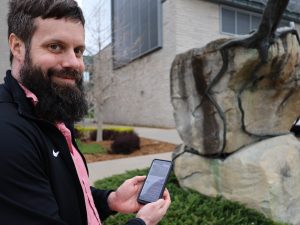 The Business Breathers series, organized by the Goodman Group, will take place online every Wednesday at 11 a.m. and will feature 30 minutes of live industry and faculty expert-led discussions, followed by a 15-minute question-and-answer period.
The Business Breathers series, organized by the Goodman Group, will take place online every Wednesday at 11 a.m. and will feature 30 minutes of live industry and faculty expert-led discussions, followed by a 15-minute question-and-answer period.Augmented reality in marketing, the ethics of exploiting loopholes and managing through the unimaginable are topics that will be discussed this month as part of a newly launched free live webinar series for the Niagara business community.
Business Breathers with Goodman’s Best will take place online Wednesdays at 11 a.m. and will feature 30 minutes of live industry and faculty expert-led discussions, followed by a 15-minute question-and-answer period.
Goodman Group, the Goodman School of Business’ community-focused learning and development services provider, created the initiative to support its clients and community partners.
“In this era of uncertainly, Business Breathers are an opportunity for entrepreneurs, leaders and others to take a break, catch their breath and take part in insightful discussion on timely topics that are relevant to their business and everyday lives,” said Abdul Rahimi, Director of Goodman Group.
Although the webinars are intended for the local business community, everyone is welcome to participate, including Brock University students, alumni, faculty and staff.
Interested participants are asked to register online. A confirmation email will provide a Lifesize link to access the webinar at the date and time it is planned.
Brave new worlds: How augmented reality transforms marketing
The free webinar series kicks off Wednesday, May 13 at 11 a.m. with a discussion on augmented reality (AR) led by Professor of Marketing, International Business and Strategy Joachim Scholz.
“AR is a relatively new channel for marketers, but there is a growing sense of urgency,” said Scholz. “More consumers are expecting AR experiences, so in my opinion, time is almost up to experiment with this technology. We’re leaving the phase where it’s okay to just play around.”
AR is often confused with virtual reality (VR), and although there are similarities between the two, Scholz says AR has more practical uses and benefits for businesses and consumers.
“AR augments the user’s physical environment with a digital component,” he said. “You might use your phone to see what a sofa looks like in your living room, or how a garment fits your body, but everything else you see is in real life. In VR, everything is a virtual environment and all you see is the digital surroundings. VR is used more in gaming and entertainment.”
AR has also been used to enhance the packaging of products. For example, wine bottles have been designed with labels that are responsive to phone apps. The label comes to life to share a brand story, or other unique digital experience.
“AR turns a normal object into another media channel for the brand, and therefore, another way of extending the brand into consumers’ lives.”
The ethics of exploiting loopholes
The webinar series continues Wednesday, May 20 at 11 a.m. with a discussion led by Professor of Organizational Behaviour, Human Resources Management, Ethics and Entrepreneurship Paul Dunn on the ethics of exploiting loopholes.
Dunn says that as governments act quickly to introduce new programs in response to the COVID-19 crisis, omissions and ambiguity in the regulations creates loopholes for people and businesses to exploit.
“A lot of this legislation is being created to help the needy — people who have been laid off or small businesses struggling to survive — but those who don’t need the support are applying, even though they know they’re not actually eligible. By looking for loopholes, some may be adhering to the letter of the law, while simultaneously violating its spirit,” he said.
“Even though an action is not specifically mentioned as prohibited, it does not mean it is ethically acceptable. We must all take the moral high ground and act, not out of pursuing personal benefit, but rather for the common good.”
Managing through the unimaginable
On Wednesday, May 27 at 11 a.m., Goodman Dean Andrew Gaudes will address leadership and business sustainability in times of COVID-19.
“It’s unimaginable to think the world would go into hibernation because of global disease,” Gaudes said. “In times like this, our foundational assumptions can be completely shaken. Without a strong foundation, we must focus on our core purpose.”
Gaudes offered the example of the University continuing to provide professional and personal fulfilment for students despite the limitations to offer face-to-face classes.
“If the University’s core purpose was to teach students in a physical classroom, we’d have to permanently shut our doors,” he said. “Instead, we are using the resources and supports available to us, and within our control, to continue with our mission.”








